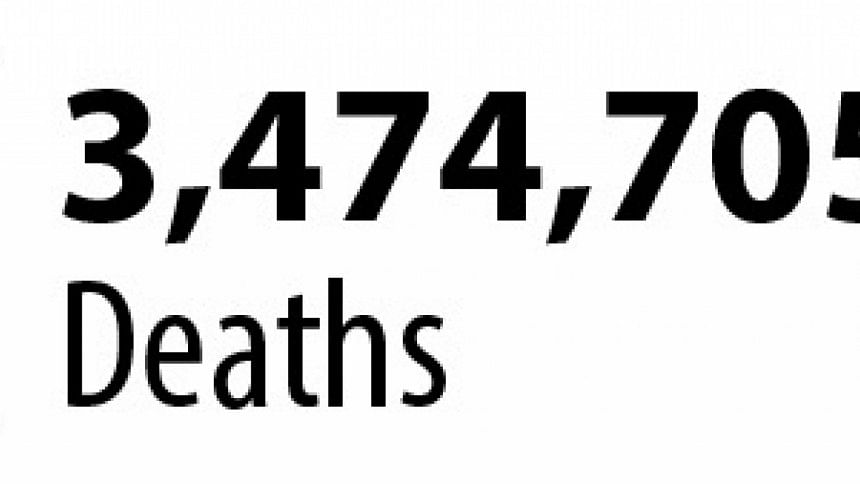India Covid Variant: Pfizer, Astra jabs highly effective
The Pfizer-BioNTech and Oxford-AstraZeneca vaccines have been found to be highly effective against the coronavirus variant that was first identified in India, according to a study by Public Health England (PHE).
The Pfizer vaccine was 88-percent effective and the AstraZeneca jab was 60-percent effective against the B1617.2 strain after the second dose.
Both the vaccines were more effective against the so-called "Kent" strain – B.1.1.7, the Covid-19 variant dominant in Britain – with Pfizer being 93-percent effective while the AstraZeneca jab was 66-percent effective over the same period.
However, they were only 33-percent effective three weeks after the first dose.
Health Secretary Matt Hancock described the outcome as "groundbreaking," while PHE said it expects to see even higher levels of effectiveness against hospital admission and death.
"This new evidence is groundbreaking and proves just how valuable our Covid-19 vaccination programme is in protecting the people we love," Hancock told broadcasters.
"I'm increasingly confident that we're on track for the roadmap, because this data shows that the vaccine, after two doses, works just as effectively (against the Indian variant)," he added.
Earlier this month, the World Health Organization (WHO) dubbed the India's B1617.2 strain a "variant of global concern".
The study, which took place between April 5 and May 16, found that both the vaccines were 33-percent effective against symptomatic disease from the B1617.2 strain three weeks after the first dose, compared with about 50 percent against the B.1.1.7 strain.
Some 12,675 genome-sequenced cases were included in the analysis, but only 1,054 were of the variant identified in India. The study included data for all age groups from April 5 to cover the period since the strain emerged.
New data from PHE shows there have been at least 2,889 cases of the B1617.2 strain recorded in England from February 1 this year to May 18.
Of those, 104 cases resulted in a visit to a hospital emergency department, 31 required overnight hospital admission and six resulted in a death.
Dr Mary Ramsay, head of immunisation at PHE, added: "This study provides reassurance that two doses of either vaccine offer high levels of protection against symptomatic disease from the B1617.2 variant.
"We expect the vaccines to be even more effective at preventing hospitalisation and death, so it is vital to get both doses to gain maximum protection against all existing and emerging variants."
DELHI TO EASE CURBS
India, the world's largest vaccine-producing nation, has fully vaccinated just over 41.6 million people, or only 3.8% of its 1.35 billion population.
New Delhi will start relaxing its strict coronavirus lockdown next week if new cases continue to drop in the city, its chief minister said.
The nation yesterday reported 240,842 new infections nationwide over 24 hours - the lowest daily new cases in more than a month - and 3,741 deaths.
For weeks, India has battled a devastating second wave of Covid-19 that has crippled its health system and led to shortages of oxygen supplies.
New Delhi, one of the worst hit cities, went into lockdown on April 20, but new cases have declined in recent weeks and test positivity rate has fallen under 2.5%, compared to 36% last month, Chief Minister Arvind Kejriwal said.
"If cases continue to drop for a week, then from May 31 we will start the process of unlocking," Kejriwal told a news conference yesterday.
Delhi reported around 1,600 new Covid-19 cases in the previous 24 hours, he said.
Many states remain in lockdown, raising worries about the economic impact of the pandemic.
The chief of state-run Indian Council of Medical Research told Reuters this month that districts with a high rate of infection should remain locked down for six to eight weeks to break the chain of transmission.
India's daily Covid-19 cases are decreasing after peaking on May 9. The government said yesterday it is conducting the highest number of Covid-19 tests, with more than 2.1 million samples tested in the previous 24 hours.
Still, experts have warned India could face a third wave of infections in coming months, and many states are unable to vaccinate those aged under 45 due to a shortage of supplies.


 For all latest news, follow The Daily Star's Google News channel.
For all latest news, follow The Daily Star's Google News channel. 



Comments